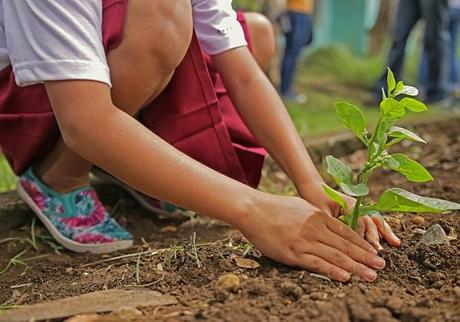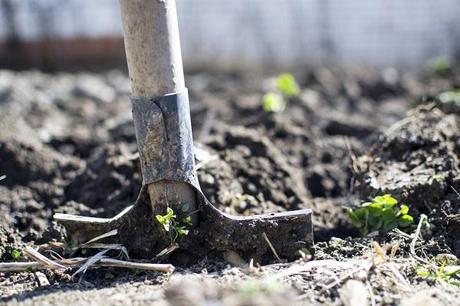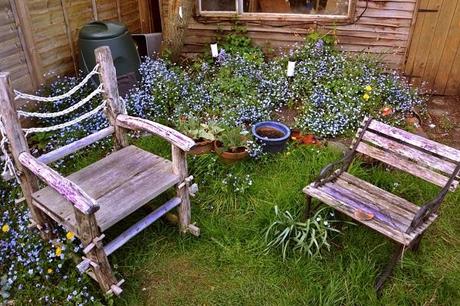
Gardening is considered to be one of the most relaxing exercises one can ever think of. Think of it this way you are tired from work and you come back home where the first thing that greets you even when you do not even enter your driveway is your lush green garden, always welcoming you back with open arms. Some people view gardening as a hobby and enjoy actively taking care of their gardens. It is really important to know that behind every beautiful garden, there is a caretaker, someone who is there every day to look after his or her precious plants. Who does not want a lush green garden? , Everyone does, but there are some steps that must be followed in order to have a healthy, growing garden. We have prepared a list of the very best gardening tips for beginners to help you on your way to becoming good at gardening…
10. Self-Made Composite
Composite Materials are the ones made from two or more materials. Every day we have leftovers from breakfast to lunch like food, fruit skins and old vegetables and overcooked or old food that find their way into the garbage bin. The very same things can be used for your garden because they provide essential nutrition for plants. An easy way to make your own composite is by having a special basket or bin in which you can gather heaps of such leftover items. Over a period of days, the heap will grow and the rotten mix of organic materials will turn into an essential nutritional dose for your plants.
9. Regular Watering
Water means life to us and the same goes for plants. Water is their most basic necessity after sunlight. Most people believe that daily watering is the way to go but they do not water enough and this can get exhausting. Another approach is that your water once a couple of days but the key here is that you do deep watering which makes the roots grow deeper and in turn makes the plants more healthy and strong.
8. Removing of Spent Flowers
People believe that once a flower blooms and decays, it means that the flowering season is over for that plant. This is not the case because the plants continue producing flowers if they are in season. To increase the flowering season all you have to do is regularly remove the old flowers which will make space for new ones.
7. Pruning
It is very important for the health and beauty of your plant that the overgrown and out-of-place shrubs must be regularly pruned. This is a very delicate procedure, especially for those plants which have slow growth rates like a mango tree. What this does is that it keeps the plant or shrub presentable to belong in your garden and at the same time more nutrition is available for a smaller plant. This makes the remaining part stronger and healthier.

6. Pests and Diseases
Once in a while, you may have heard of whole forests brought to the ground due to diseases and pests. Yes, like us plants are also living beings and they have diseases but unlike us, plants cannot tell us about their problems. It is the job of the gardener or the caretaker of the plants to be aware of such anomalies and regularly survey the plants for diseases and use pest spray to keep away seasonal insects. Pests suck the life out of their host and leave behind a dead plant, it is very important that your plant be free from any parasites.
5. Grouping of Plants
One of the most common mistakes beginners make is that they think that beauty is in mixing different plants together to get a colourful garden. It is strictly advised by professional gardeners that plants of similar species must be grouped together. There are various reasons for this and one is that different plants prefer different types of soil and composite and it is healthier for them if they are grouped together. Another important thing to keep in mind is that different species require different amounts of water and if you overwater a species that requires just a little every few days then this will cause decay of its roots and eventually you will have a dead plant.
4. Mulching of Soil
Mulch is a material that you spread on top of your soil to preserve it from weed growth or to preserve the moisture and health of the soil. This keeps away the weeds which means that your plant does not have any kind of competition in its growth. Weeds compete for moisture and nutrients and can result in devastating consequences for your garden. Another reason is to keep the moisture preserved because mulch prevents loss of moisture through evaporation.
3. Instructions are to be followed
Fertilizers are there for a reason and there are good reasons instructions are followed. Each fertilizer has its own amount and procedure to be injected into the soil. Some require just direct sprinkling over the soil while others need to be mixed with water first and then applied to the soil. People ignore such instructions given by the manufacturers and this makes the fertilizers less effective in plant growth. Sometimes it is good to follow them to experiment on your own, especially in the case of fertilizers.

2. Use of Organic Fertilizers
It is not necessary that you have to buy fertilizer online from professional manufacturers. The best fertilizers are the ones made by you. Use as much organic fertilizer as you can because they can cause no harm to your plants. They encourage the growth of roots which makes your plant grow and prolongs its life span. Organic fertilizers do this because they increase the nutrient concentration in your soil which your plant sucks in through the soil.
1. Know Your Soil
The most important information you need before any type of gardening is about your soil. Every soil is different and deserves totally different attention and nutrients. The three most basic soil types are sandy, clay and silt soil. You can get to know your soil type by contacting the nearby plant nursery. This is critical in your gardening because some plants grow only in a specific soil type and you need to know beforehand so that you do not lose time over a plant that is not meant to be in your garden.

